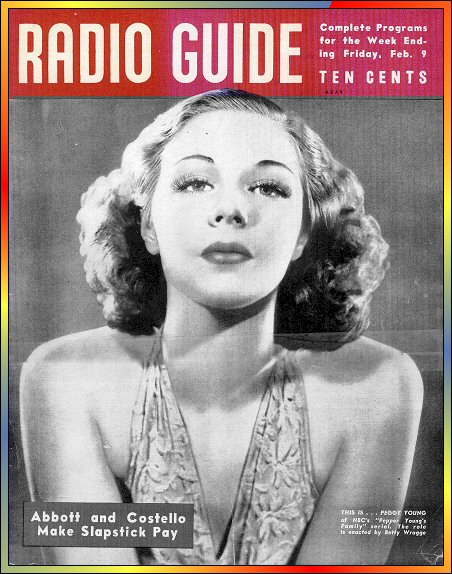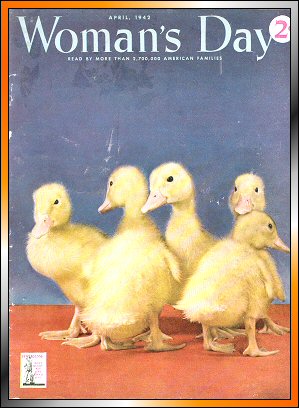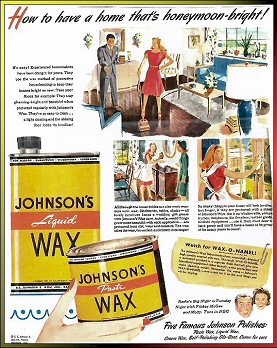Listeners Not Impressed
With Radio Commercials
"Rinso White, Rinso Bright..... birdies sing it all day
long---
Why blame that awful jingle on the birds?"
--- Radio Listener
Lincoln, Me. (DG)---
 When direct advertising on radio was permitted, it was a boost for
the sponsors of the radio programs. Now the announcers could try their
best to persuade the listeners to buy the product during the commercials. While we know the sponsor liked the direct sell commercials, how did the
radio listeners feel when they heard them? For the most part, they simply
didn't share the same kind of warm affection as the sponsors did. When direct advertising on radio was permitted, it was a boost for
the sponsors of the radio programs. Now the announcers could try their
best to persuade the listeners to buy the product during the commercials. While we know the sponsor liked the direct sell commercials, how did the
radio listeners feel when they heard them? For the most part, they simply
didn't share the same kind of warm affection as the sponsors did.
Radio Guide magazine (a.k.a. Movie-Radio Guide)
was an excellent source on how the listeners
felt concerning what they
heard on the radio. Listeners weren't bashful in writing letters to the
magazine to voice their opinions. It wasn't surprising to find some
letters from disgruntled radio listeners on the subject of radio
commercials.
The primary complaint of the listeners' discontent was the time allowed
for the sponsor. To prove the point of too much advertising, a listener
timed the actual story during a 15 minute daytime serial program. Out of
the 15 minutes the program was allowed, there was about 9 minutes of the
actual story. The other 6 minutes consisted of the program's opening and
closing, to which the sponsor was usually mentioned--- and of course the
commercials.
Another complaint was the type of product that was sponsored and the
time of day it was heard. A listener wrote Radio Guide with
the complaint as to why a laxative product had to be heard during an early
morning radio program at breakfast time. The listener lost her
appetite when she heard of the wonderful things the laxative did for the
specific areas of the human body where a laxative was used. The word "waste"
was also used in the commercial. When the word was used in association
with a laxative, it could take away even the most robust appetite. The
listener suggested if the laxative commercial had to be presented on the
air, move it to another time in the day when it wasn't time to eat.
 Woman's Day magazine conducted a poll on what radio
commercials listeners liked and disliked the most. It wasn't surprising
the response was overwhelming. Of the radio commercials the listeners
hated the most, some of them are classic today. On the dubious list were
commercials for Duz, Ivory Soap, Super Suds, Rinso, Raleigh
Cigarettes, Lifebuoy Health Soap, Cuticura Soap, and
all laxatives and deodorants. Woman's Day magazine conducted a poll on what radio
commercials listeners liked and disliked the most. It wasn't surprising
the response was overwhelming. Of the radio commercials the listeners
hated the most, some of them are classic today. On the dubious list were
commercials for Duz, Ivory Soap, Super Suds, Rinso, Raleigh
Cigarettes, Lifebuoy Health Soap, Cuticura Soap, and
all laxatives and deodorants.
Heading the unpopular list was Lucky Strike, who at the
time sponsored THE JACK BENNY PROGRAM and YOUR HIT
PARADE--- 2 of radio's most popular programs.
The source of their displeasure was the constant yelling of "LS/MFT",
and the chant of the tobacco auctioneers, L.A. "Speed" Riggs of
Gouldsboro, North Carolina and F. E. Boone of Lexington, Kentucky.
As if the Lucky Strike commercials on THE JACK
BENNY PROGAM were bad enough, the listeners sounded off their
frustration at the program's closing commercial, Herbert Tareyton
Cigarettes. The listeners heard the announcer exclaim, "Herbert
Tareyton is back!" The radio listeners wished ol' Herbie
would go away!
 The Woman's Day poll also
mentioned some radio commercials the
listeners didn't mind listening to. Their top pick was the "commercial"
for Johnson's Wax on FIBBER McGEE & MOLLY. The Woman's Day poll also
mentioned some radio commercials the
listeners didn't mind listening to. Their top pick was the "commercial"
for Johnson's Wax on FIBBER McGEE & MOLLY.
During the halfway point of the program, announcer Harlow Wilcox came
to the McGee home to talk with Fibber and Molly McGee. When he showed up, the
listeners knew it was time for some words about Johnson's Wax---
although they didn't how and when Wilcox was going to do this. Much to Fibber's
chagrin, "Waxy" (Wilcox's nickname) easily slid Johnson's
Wax into the conversation.
The listeners liked this type of commercial, because Wilcox presented it
while the program continued without interruption. These commercials were
also filled with humorous comments. This type of commercial presentation
was the best of all worlds for the radio listeners and the sponsor.
Overall, the radio listeners realized it was the sponsors that brought
the programs to the airwaves--- and commercials simply went with the
territory. In all honesty, their opinion on radio advertising is the same
as our likes and dislikes of TV advertising today. |